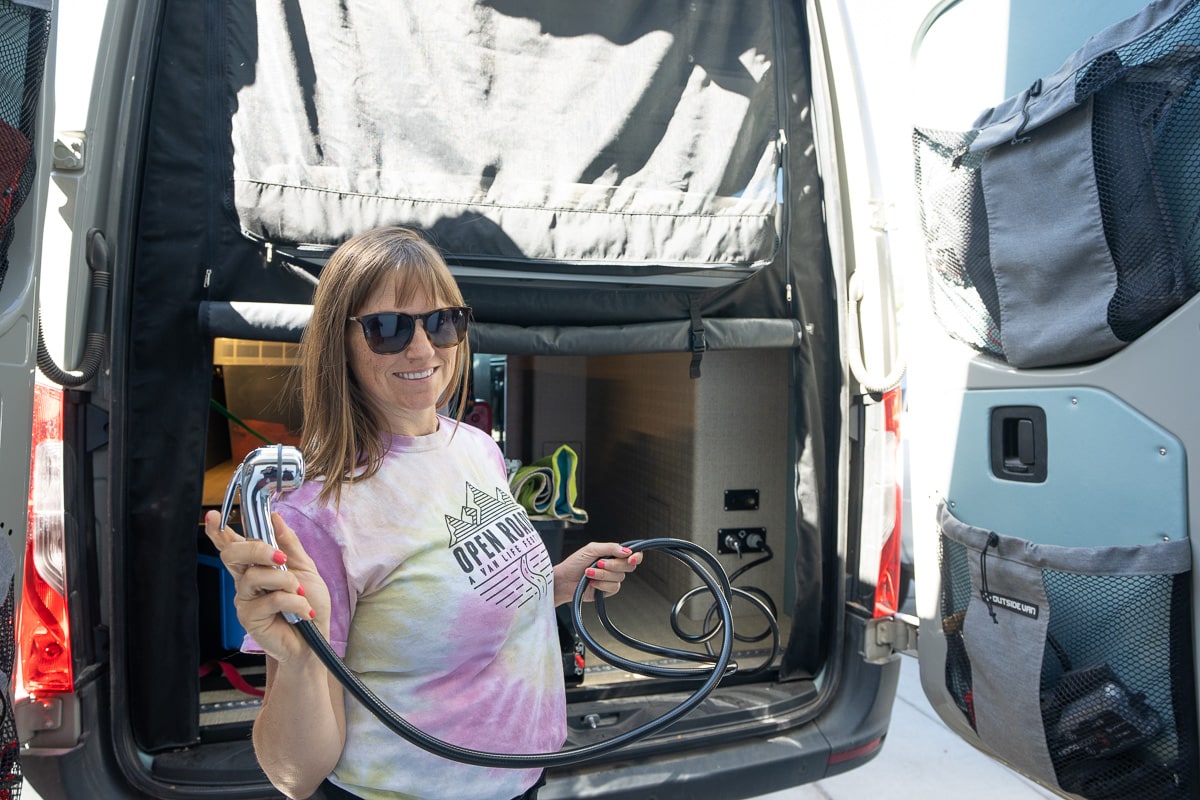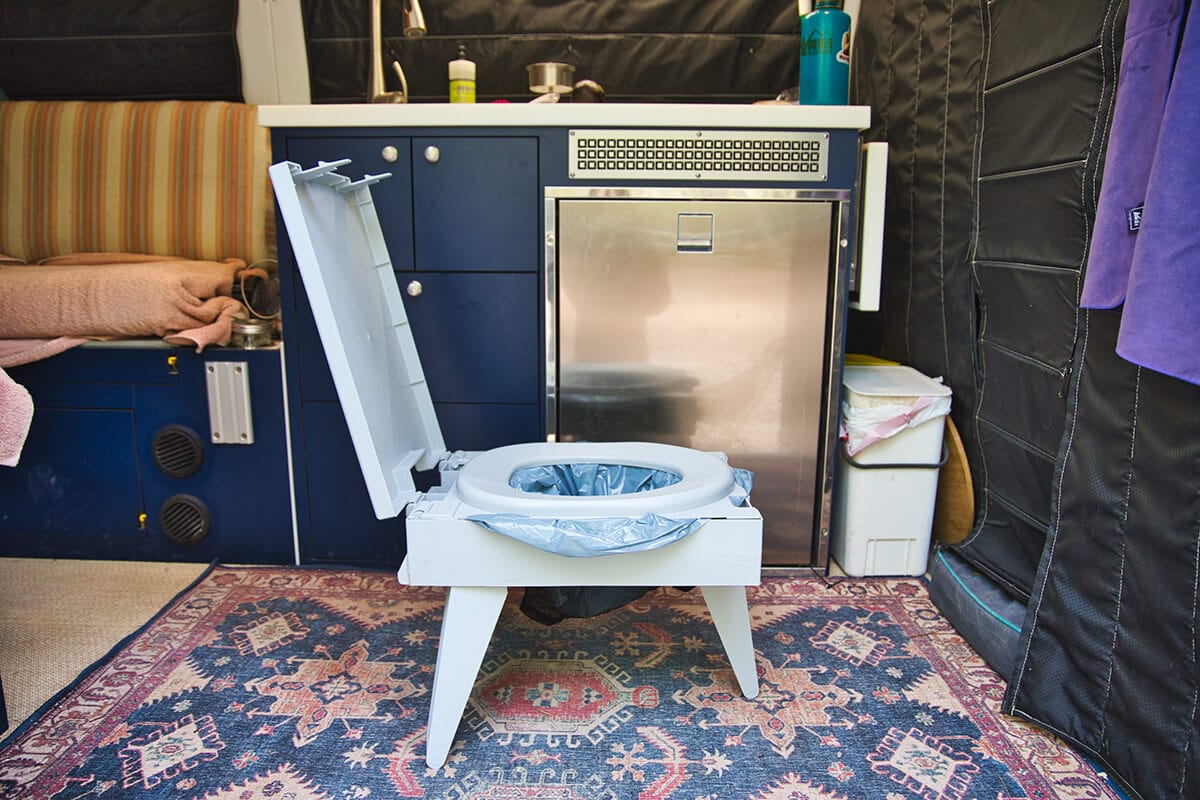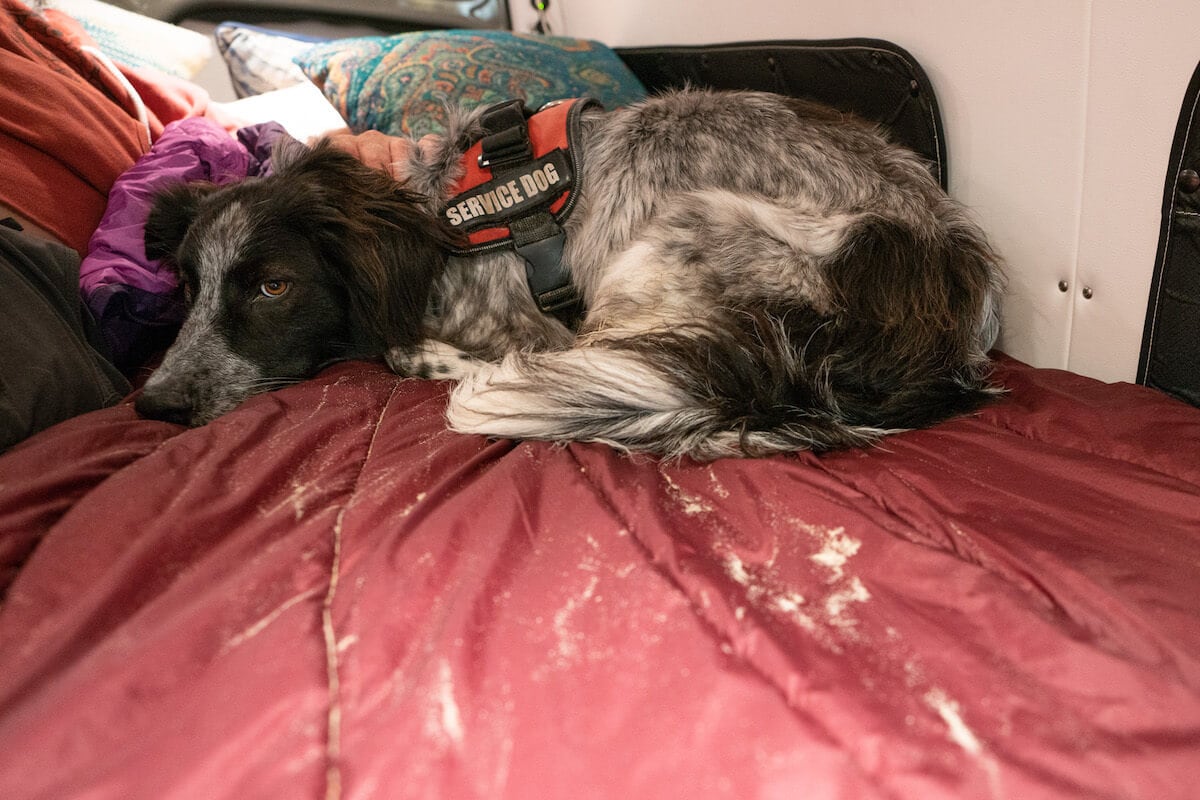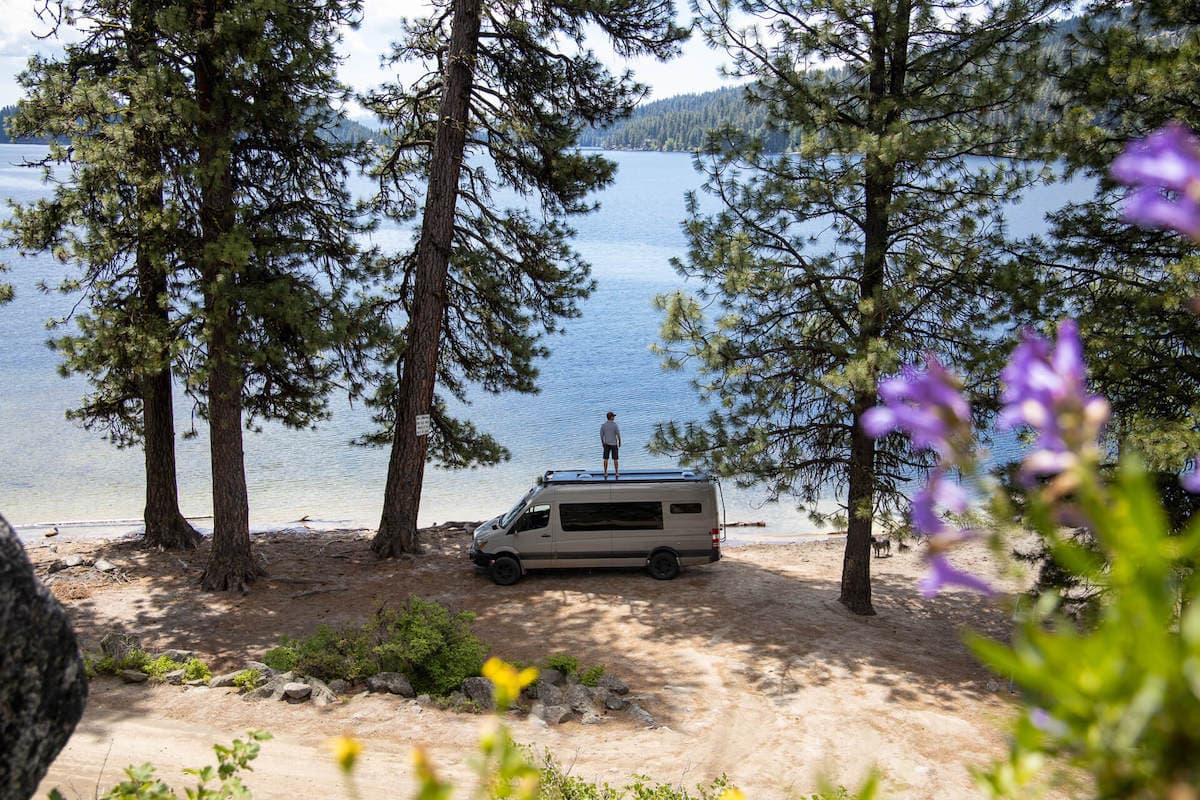Find this post helpful? Learn how you can support Bearfoot Theory’s work here. You can also shop for gear through the affiliate links in this blog post where we get a small commission at no cost to you. It helps keep our team running and the lights on. THANK YOU! -Kristen
Access to limitless running water is a luxury that you may have taken for granted before living on the road. If you’re doing van life, you need to conserve water not only for drinking but also for dishes, cooking, showers, cleaning, laundry, and self-care.
One of the biggest challenges of living off-grid in a camper van is budgeting your water usage so it can last as long as possible. No one wants to leave a campsite with epic views because they ran out of water sooner than planned.
Since 2016, I’ve lived part-time in my converted Sprinter Van with my partner Ryan and now our baby, and I have a 25-gallon water tank. I have found that when I don’t shower and do my best to conserve my water, I can live off-grid with my family for about 5-7 days before I need a refill.
It’s not always easy to conserve water while living full-time on the road, especially when your body and possessions get grimy. Conserving water requires intentional effort and awareness. However, the rewards are worth it. Reducing the amount of water you use daily helps the environment, reduces your chores, and allows you to stay at that epic campsite longer.
In this article, I share my tips for how to conserve water as a full-time van lifer so you can keep clean while being off-grid for as long as possible.

Download my FREE Outdoor Trip Planning Toolkit
Enter your email to get access to printable PDF packing checklists, itineraries, and more.
1-on-1 Van Life Coaching
Ready to get over your analysis paralysis and put your van life dreams into action? Let’s make it happen together. Book a 1-on-1 van life coaching call now and take the first step towards a life of adventure, freedom, and unforgettable experiences.
Van Life Water Conservation Tips
Below are my best tips on how to budget your limited supply of water on the road as a van lifer.
1. Cook with fewer dishes
When you eat three meals per day in a van, it’s easy to create more dishes for yourself than necessary. I try to be mindful of which dishes I grab while preparing food and which recipes I choose to make in the van.

2. Reuse dishes
Most of the time, my dishes don’t get too dirty. So I try to use dishes multiple times before washing them whenever possible.
If I’m eating lunch and only have a few crumbs on my plate, I’ll use the same plate for dinner that night. That way, I can get multiple uses out of it before washing.
Depending on the meal, I’ll even eat out of the pan I cooked in so I don’t dirty another dish. Sometimes, Ryan and I each grab a fork and eat out of the pan together!

3. Wipe dishes clean before washing them
Once I finish eating, I try to make my dishes as clean as possible before putting them in the sink for washing. This prewash makes for less scrubbing and less water usage.
I’ll wipe my plate or bowl with bread or a used napkin. You can even catch me licking my bowl clean sometimes!
If there are any excess food scraps or remnants on pans, I scrape these into my trash can before cleaning them. I try to do this as soon as I finish cooking so food residue doesn’t accumulate.

4. Conserve dishwater
When you live in a van, you no longer have the luxury of throwing your dishes into the dishwasher without a second thought. You must wash all of your dishes by hand.
Here are my tips for using less water while washing your dishes:

5. Use less water for showering
Although it may sound tempting, I argue that you don’t need an indoor shower in your van as a shower adds a lot to your build cost and takes up a huge amount of space. An indoor shower also means you’ll blow through your water a lot more quickly.
At the most, you might have a 30-gallon water tank in your van. If you’re using this to do dishes, fill your water bottles, AND shower regularly, you’ll be filling up your tanks every 2-3 days.
This might sound crazy, but I can comfortably go a week without showering when I’m in my van. In fact, during the height of the pandemic, I went a month without a proper shower because I wasn’t interested in using public facilities.
I used body wipes and swam in lakes and rivers to rinse off, and I didn’t stink any more than I would when showering every couple of days. Don’t believe me? I challenge you to go for a week and see what happens!
If you do choose to have an indoor or outdoor shower in your van, you’ll want to follow these tips for conserving water while you shower:

6. Don’t let the faucet run
When taking care of personal hygiene, it is important to turn the faucet off whenever possible. This helps prevent wasting perfectly clean water.
When I brush my teeth, I don’t let the faucet water run the entire time. I wet my brush, turn the water off, brush, and then turn on the faucet again to rinse.
The same thing goes for when I’m washing my face or when Ryan is shaving. It ultimately saves a lot of water!
When I wash my hands, I turn the faucet off while scrubbing my hands with soap. I also try to wash my hands in public restrooms rather than waiting to wash my hands in the van.
Hand sanitizer is also a great option for quickly cleaning your hands without water. I keep a bottle in my cup holders and use that to sanitize after touching the gas pump.

7. Refill your water bottles in public spaces
Filling up your reusable water bottle in public spaces instead of in your van will help conserve your water. Gas stations, campgrounds, public parks, and restaurants are convenient places to refill water bottles.
I’ll also refill my CamelBak hydration reservoir in public places so I have even more drinking water in the van. If I can fill my dogs’ water bowls too, I’ll try to do that in public spaces like parks.
BFT contributor Kaylin and her husband use a separate 5-gallon water container for drinking water in their van. They fill it up in public places with spigots and only use that water to refill their water bottles and make coffee. This method allows them to save the water in the 20-gallon tank in their van for dishes and personal hygiene.

8. Conserve toilet water
There are many toilet options for van life. Some of these toilets use less water than others (or even no water at all).
If you have a cassette or other flush toilet in your van or RV, you should fill up the rinse water at the dump station.
Another option that uses even less water is a composting toilet or a toilet that uses wag bags. For #2, I use a foldable Go Anywhere toilet that doesn’t take up much space. I discard the bags outside in trash cans.
For #1, I use a pee jar. To clean it, I spray the inside with cleaning vinegar. I let it sit for a bit, then add a small amount of water, shake it around and dump it outside.
When it comes to going to the bathroom, another way to save water is to use public facilities when possible. Campgrounds, gas stations, rest areas, trailhead bathrooms – while I think most of us would prefer using the toilet inside our van, using public bathrooms saves water and also cuts down on chores related to emptying and cleaning your toilet.

9. Clean with spray bottles
When I camp, I don’t want to spend my precious time cleaning my van when I could be outside enjoying the fresh air. For this reason, I try to keep my van tidy and clean up messes as they happen.
But when I camp in an area with a lot of dirt and sand, I notice that the interior of my van starts to reflect this after a few days – especially with two dogs in the van. When I see dirt on the cabinets, dashboard, and floor, I know I need to spend at least a few minutes freshening up my space.
First I vacuum (I bring the Dyson V15 cordless vacuum in my van) to suck up the dirt. Then I use a spray bottle of Attitude Kitchen cleaner or Attitude multipurpose cleaner to wipe up messes. This cleaner is certified by the Environmental Working Group to be safe and free of harsh chemicals, so I feel good about using it in my small space.
This system is much more efficient than using a bunch of water for cleaning or wiping the floor. I usually spray everything down and then use a microfiber towel to clean up all of the surfaces.

10. Wash your clothes sparingly
The last thing I want to do when traveling is laundry! I try to go as long as possible without washing my clothes.
I often wear my shirts, pants, and shorts for multiple days before putting them in my dirty clothes bag. If I’m hiking day after day, there’s no sense in getting a clean shirt dirty.
When it comes to doing laundry, the best way to conserve your van’s water is to find a laundromat nearby on iOverlander or Google and pay for a few loads. I only try to do this every 2-3 weeks to maximize my time outside.
However, if you need to wash a couple of items in between your laundromat trips, I recommend hand-washing small amounts of laundry in a bucket with biodegradable detergent. Another popular option among van lifers is a Scrubba, a compact bag for washing your clothes on the go – although I’ve heard that the Scrubba does require a lot of water for rinsing.
For both of these methods, I recommend using water from a natural source or a public spigot so you don’t use too much from your water tanks.

11. Collect rainwater for plants
While I personally don’t have plants in my van, if you do, you don’t need to use water from your tank to water them. You can collect rainwater to give to your plants.
Some of my van lifer teammates recommend setting out a small jar to collect droplets. You can pour this rainwater into a spray bottle to save it and use it for your plants as needed.
Why is Water Conservation Important?
You may be wondering why it is important to conserve water while living full-time on the road. There are benefits to both yourself and the environment when you conserve water.
As a full-time van lifer, you don’t have an endless supply of water. Depending on your campervan water system, you likely have a tank that holds 30 gallons of water or less at a time.
While a solution for saving water could be to get a bigger tank, water weighs a lot. A bigger water tank could exceed your camper van weight consideration and payload. Water tanks also take up a lot of space inside your van.
It is crucial to make your water last as long as possible and conserve this precious resource.

How to Leave No Trace While Conserving Water
Whether I’m at home or living in my van, I try to use products that lessen my environmental footprint, including biodegradable soaps, cleaning products, and toothpaste. Ideally, I look for unscented products that are verified by the Environmental Working Group. While these products are better for health, they can still damage the ecosystem, especially when using them outside.
If you are trying to conserve water while living full-time in your van, here are some tips for following Leave No Trace guidelines regarding water usage:

Interested in van life? Check out these sources to help you live on the road:
Save this post to Pinterest
Do you have any clever ways to conserve water as a full-time van lifer? I’d love to hear them! Let me know your ideas in the comments.
Related Posts

